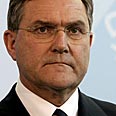
Germany: Israel ready for Shebaa Farms talks
In special interview with Ynet, German Defense Minister Jung says ‘We have received signals from Israel that it would be willing to enter negotiations on the Shebaa Farms, and the Lebanese Prime minister is also relaying positive messages regarding the possibility of stability in the region’; adds: German naval force will begin to operate in two weeks, ‘as soon as we go in, Israeli vessels will leave Lebanese territorial waters’
Germany is currently playing a major role in the efforts to release kidnapped Israeli soldiers Ehud Goldwasser and Eldad Regev; the head of the German intelligence agency, Ernst Uhrlau, is in the Middle East to conduct secret talks on the issue.
In a special interview with Ynet, Yung said regarding the ceasefire in Lebanon, “We have very encouraging signs from all parties involved. We have received signals from Israel that it would be willing to enter negotiations on the Shebaa Farms, and the Lebanese Prime minister is also relaying positive messages regarding the possibility of stability in the region, especially along the border with Israel.
“Syria is also indicating that it wants to stabilize the situation,” he said. “This is why the German government is sending its foreign minister on a tour of the region.”
Jung made the comments as the Bundestag was convening to approve the deployment of German naval forces in Lebanon. Germany has made it clear that it would not allow Israel to operate in Lebanese territorial waters.
German navy vessels will control the area from Rosh Hanikra in the south to the Lebanon-Syria border in the north.
Jung said Germany has sent customs agents and police officers to Beirut’s airport to prevent the transfer of arms.
'Israeli vessels will leave Lebanese territorial waters'
On Thursday the defense minister will attend a special ceremony at Wilhelmshaven Port and see off the German ships leaving for the Middle East. The German naval force will include eight ships – among them two frigates carrying two helicopters each, and six escort ships.
The force will number 2,400 men, including intelligence, air force and commando troops.
The force’s mandate will officially end in a year’s time, but Jung said this period will almost certainly be extended.
Commando troops aboard the frigates will be able to take over suspicious vessels attempting to smuggle weapons to Hizbullah.
“The naval force under Germany’s command will begin to operate in two weeks,” Jung said. “As soon as we go in, Israeli vessels will leave Lebanese territorial waters. We have an agreement on this with the Israeli government.”
The minister said the Germans would use force against any vessel carrying weapons slated for Hizbullah members.
Does the past and Israel’s special relationship with Germany play a part in Germany’s contribution to the Lebanese forces?
“Of course. Firstly, we feel an obligation to help in achieving a stable peace in the Middle East that will benefit both Israeli’s and Arab nations. We have complete trust in the Israeli side of things. Polls have shown that 72 percent of Israel’s citizens support sending German troops to UNFIL in Lebanon, and that shows trust in us. We also have trust from the Lebanese government and Syria.”
What are you eventually aspiring for?
“Germany is interested in achieving a stable peace in the Middle East. Sending troops to UNFIL is Germany’s contribution to stabilizing the cease fire and reaching a long lasting solution of peace for the Middle East conflict. That is the complete goal, and that’s why we also want the Quartet to resume efforts for peace between Israel’s and Palestinians through the road map.”
There were many doubts in Germany as to whether it was appropriate involving German soldiers in the Middle Eastern conflict, so close to Israel, because of the past and due to the fact that Germany has such good relations with all countries in the area.
Another reason for the hesitation is the fact that about 8,000 German soldiers are already stationed in 10 countries around the globe, and a significant number of parliament members believe that is too much and involves Germany in disputes like Afghanistan and Kosovo.










